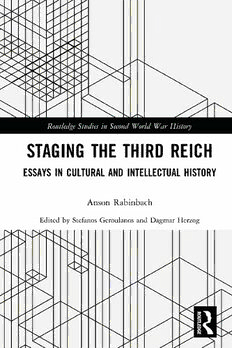
Staging the Third Reich: Essays in Cultural and Intellectual History PDF
Preview Staging the Third Reich: Essays in Cultural and Intellectual History
Staging the Third Reich A widely celebrated intellectual historian of twentieth-century Europe, Anson Rabinbach is one of the most important scholars of National Socialism working over the last forty years. This volume collects, for the first time, his pathbreaking work on Nazi culture, antifascism, and the after-effects of Nazism on postwar German and European culture. Historically detailed and theoretically sophisti- cated, his essays span the aesthetics of production, messianic and popular claims, theethosthatNazismdemandedofitsadherents,thebrilliantandsometimessuc- cessfuleffortsofantifascistintellectualstocounterHitler’srise,themostsignificant concepts to emerge out of the 1930s and 1940s for understanding European authoritarianism, the major controversies aroundNazism that took place after the regime’s demise, the philosophical claims of postwar philosophers, sociologists, andpsychoanalysts—fromTheodorAdornotoHannahArendtandfromAlexan- derKlugetoKlausTheweleit—andtheroleofAuschwitzinEuropeanhistory. Anson Rabinbach isPhilipandBeulahRobbinsProfessorofHistoryEmeritus at Princeton University. He is the author of The Human Motor (1990), In the Shadow of Catastrophe (1997), and The Eclipse of the Utopias of Labor (2018), and co-editor of The Third Reich Sourcebook (2013). He is a founding editor of New GermanCritique. Stefanos Geroulanos is Professor of History at New York University, a co- executive editor of theJournal of the History of Ideas, and the author of Transparency in Postwar France (2017) and The Human Body in the Age of Catastrophe (with Todd Meyers,2018). Dagmar Herzog is DistinguishedProfessor of History andDanielRoseFaculty Scholar, Graduate Center, City University of New York, and the author of, among others, Sex after Fascism (2005), Cold War Freud (2017), and Unlearning Eugenics(2018). Routledge Studies in Second World War History TheSecondWorldWarremainstodaythemostseismicpoliticaleventofthepast hundred years, an unimaginable upheaval that impacted upon every country on earthandisfullyingrainedintheconsciousnessoftheworld’scitizens.Traditional narrativesoftheconflictareentrenchedtosuchadegreethatnewresearchtakeson aneverimportantroleinhelpingusmakesenseofWorldWarII.Aimingtobring to light the results of new archival research and exploring notions of memory, propaganda, genocide, empire, and culture, Routledge Studies in Second World WarHistoryshedsnewlightontheeventsandlegacyofglobalwar. Recent titles in this series Advancing Holocaust Studies Edited and introduced by Carol Rittner and John K. Roth Staging the Third Reich Essays in Cultural and Intellectual History Anson Rabinbach Edited by Stefanos Geroulanos and Dagmar Herzog The Polish Wild West Forced Migration and Cultural Appropriation in the Polish-German Borderlands, 1945–1948 Beata Halicka Food in Wartime Britain Testimonies from the Kitchen Front (1939–1945) Natacha Chevalier The Construction of a National Socialist Europe during the Second World War How the New Order Took Shape Raimund Bauer For more information about this series, please visit: www.routledge.com/ Routledge-Studies-in-Second-World-War-History/book-series/WWII Staging the Third Reich Essays in Cultural and Intellectual History Anson Rabinbach Edited by Stefanos Geroulanos and Dagmar Herzog Firstpublished2020 byRoutledge 2ParkSquare,MiltonPark,Abingdon,Oxon,OX144RN andbyRoutledge 52VanderbiltAvenue,NewYork,NY10017 RoutledgeisanimprintoftheTaylor&FrancisGroup,anInformabusiness ©2020AnsonRabinbach;selectionandeditorialmatter,StefanosGeroulanos andDagmarHerzog TherightofAnsonRabinbachtobeidentifiedasauthorofthisworkhas beenassertedbyhiminaccordancewithsections77and78ofthe Copyright,DesignsandPatentsAct1988andtherightofStefanos GeroulanosandDagmarHerzogtobeidentifiedastheauthorsofthe editorialmaterialhasbeenassertedinaccordancewithsections77and78 oftheCopyright,DesignsandPatentsAct1988. Allrightsreserved.Nopartofthisbookmaybereprintedorreproduced orutilisedinanyformorbyanyelectronic,mechanical,orothermeans, nowknownorhereafterinvented,includingphotocopyingandrecording, orinanyinformationstorageorretrievalsystem,withoutpermissionin writingfromthepublishers. Trademarknotice:Productorcorporatenamesmaybetrademarksor registeredtrademarks,andareusedonlyforidentificationandexplanation withoutintenttoinfringe. BritishLibraryCataloguing-in-PublicationData AcataloguerecordforthisbookisavailablefromtheBritishLibrary. LibraryofCongressCataloging-in-PublicationData Acatalogrecordhasbeenrequestedforthisbook ISBN:978-0-367-81897-5(hbk) ISBN:978-1-003-01069-2(ebk) TypesetinBembo byIntegraSoftwareServicesPvt.Ltd. Contents “Theattractionoffascismitself”:AnsonRabinbach’swritingson Nazismanditsopponents 1 STEFANOSGEROULANOSANDDAGMARHERZOG PARTI Nazism 19 1 TheBeautyofLabor:TheaestheticsofproductionintheThird Reich(1976) 21 Appendix:Noangelfromhell:ThecollapseoftheSpeermyth(2006) 42 2 OrganizedmasscultureintheThirdReich:ThewomenofKraft durchFreude(1986) 58 3 Theemotionalcoreoffascisminitsmostvirulentpsychic manifestations(1989) 66 CO-AUTHOREDWITHJESSICABENJAMIN 4 Thereader,thepopularnovel,andtheimperativetoparticipate: ReflectionsonpublicandprivateexperienceintheThirdReich (1991) 83 5 Naziculture:Thesacred,theaesthetic,andthepopular(2005) 108 6 ThehumanitiesinNaziGermany(2006) 138 CO-AUTHOREDWITHWOLFGANGBIALAS vi Contents 7 Thetemporaryalliancebetweentheeliteandthemob:Reflections onthecultureandideologyofNationalSocialism(2013) 174 PARTII Antifascism 187 8 Antifascism(2006) 189 9 ThepoliticizationofWilhelmReich(1973) 198 10 Stagingantifascism:TheBrownBookoftheReichstagFireandHitler Terror(2008) 205 11 FreedomforThälmann!:TheCominternandthecampaigntofree ErnstThälmann,1933–1939(2017) 231 12 Unclaimedheritage:ErnstBloch’sHeritageofOurTimesandthe theoryoffascism(1977) 246 13 Manonice:ThepersecutionandassassinationofOttoKatz(2006) 263 PARTIII Aftermath 293 14 TowardaMarxisttheoryoffascismandNationalSocialism:Areport ondevelopmentsinWestGermany(1974) 295 15 EichmanninNewYork:TheNewYorkintellectualsandthe HannahArendtcontroversy(2004) 319 16 TheFrankfurtSchoolandthe“JewishQuestion,”1940–1970(2013) 335 17 ThemythandlegacyofAlexanderMitscherlich(1995) 357 18 TheJewishQuestionintheGermanQuestion:Onthe Historikerstreit(1988) 369 19 “Theabyssthatopenedupbeforeus”:ThinkingaboutAuschwitz andmodernity(2003) 398 Contents vii Appendix:ClaudeLanzmann’sShoahandthedeathmachine(1986) 411 20 Momentsoftotalitarianism(2006) 418 “Nazismwasauniquemodernistproject”:InterviewwithAnson Rabinbach,December2,2019 450 JONATHONCATLIN,DAGMARHERZOG,STEFANOSGEROULANOS Index 481 “ ” The attraction of fascism itself ’ Anson Rabinbach s writings on Nazism and its opponents Stefanos Geroulanos and Dagmar Herzog Anson Rabinbach, Philip and Beulah Rollins Professor of History Emeritus and former Director of the European Cultural Studies program at Princeton University, is the author of five books, the editor of several others, and a founding editor of the journal New German Critique ever since 1973. Respected as a major historian of twentieth-century European thought, and known as one of the most important scholars of Nazi culture working in the last thirty years, he has bridged intellectual history with labor history, critical theory, and the history of technology. Until now, however, Rabinbach’s work on Nazi culture, antifascism, and the after-effects of Nazism on postwar Euro- pean culture has remained dispersed across a large number of publications, many of them unknown, and in a four-decade-long career of teaching and conference and editorial participation. These texts were so scattered that before we embarked on this project, neither of us had even heard of a significant number of those that we include here, despite having known Rabinbach well as both mentor and friend for twenty-plus years. Out of the close to forty main publications in these fields, we have gathered the twenty-two most sig- nificant of Rabinbach’s essays on Nazism, antifascism, and the theories and debates on fascism after 1945. These present both his contribution to Nazi and European intellectual and cultural history and his manner of engaging with the ways in which the Third Reich’s main actors and its opponents staged their culture and their conflict with one another. Part I brings together Rabinbach’s principal essays on National Socialism. Some of the essays in this section, for example “Nazi Culture” and “The Humanities in Nazi Germany,” treat broad swaths of culture and politics in Germany, and explore the complicity of intellectuals and other elites—both by conviction and by careerism—in the Nazi enterprise. Others, notably the essays on Albert Speer’s work and the architecture of the “Beauty of Labor” program, on reading, on the women of Kraft durch Freude, as well as the introduction to Klaus Theweleit’s book Male Fantasies address more specific aspects, enriching our grasp of the aesthetics, psychological appeal, and radicalization of the Nazi movement and regime. Part II gathers Rabinbach’s essays on antifascism, parts of a long-standing project that did not materialize into a book. It brings forth the history of
